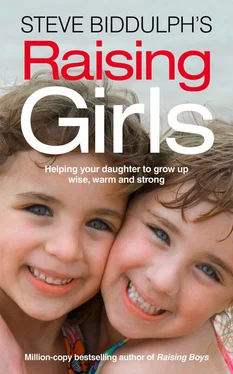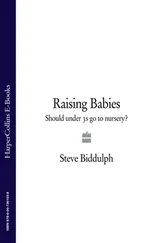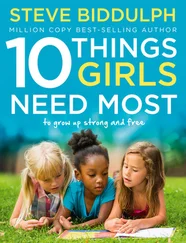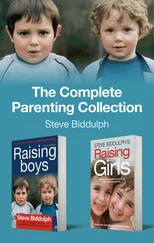About the Publisher Конец ознакомительного фрагмента. Текст предоставлен ООО «ЛитРес». Прочитайте эту книгу целиком, купив полную легальную версию на ЛитРес. Безопасно оплатить книгу можно банковской картой Visa, MasterCard, Maestro, со счета мобильного телефона, с платежного терминала, в салоне МТС или Связной, через PayPal, WebMoney, Яндекс.Деньги, QIWI Кошелек, бонусными картами или другим удобным Вам способом.
Dear Reader
Let me tell you a bit about myself before you jump into this book, so that you can know the person behind the words. People often think I must have boys, because I wrote and campaigned about boys for many years. In fact our first child was a boy (a man now). When our friends asked what we wanted next, I said I didn’t mind, and I really believed that was true. But when our daughter was born – by emergency caesarean, with me in the theatre trying my best not to faint – I was overjoyed. I couldn’t believe how happy I was. That happiness has never gone away.

I wrote about boys for just one reason – they were a disaster area, and the ethic of my work is to go where the need is greatest. Back in those days, girls were doing just fine. But about five years ago that started to change. We began to see a sudden and marked plunge in girls’ mental health. Problems such as eating disorders and self-harm, which once had been extremely rare, were now happening in every classroom and every street. But more than this, the average girl was stressed and depressed in a way we hadn’t seen before.
Girls aren’t born hating their bodies. They aren’t born hating their lives. Something was happening that was poisoning girls’ spirits. It seemed to come on in the early teens, but was creeping younger and younger every year.
In response, a worldwide movement sprang up – of girl advocates, therapists and researchers – to try and mobilise parents and the community. Many of these people were my friends, and together we saw the need for a simple, parent-friendly book to help get girlhood back on track. That is the book you now hold in your hands.
Raising strong girls starts young. We have to love them well, and we have to fight the forces that would bring them down. We have to make good choices because the world today does not seem to care about girls as it should, and sees them just as a way to make money. Of course some of these things are timeless. Girls have always needed to be strong.
Girlhood is a quest, a journey of gathering the wisdom needed to be a woman. We are our daughters’ guides on that quest. To do this we need good maps, good examples, and good clear eyes.
Perhaps your daughter is just a little baby. Perhaps she is in her teens. Whatever age, I hope this book lifts you up, fills you with a fire to make the world a better place for her and for all girls. And helps you to give her all the love you feel.
Sincerely,
Steve Biddulph
Meet Kaycee and Genevieve
There are two girls that I would like you to meet. Their names are Kaycee and Genevieve. Both are 17, and both are in Year 12 at school. They are great kids, friendly and bright, you would enjoy talking to them.
These two have known each other since nursery. They were best friends all through primary school and everyone thought they would be that way forever. But around the time Kaycee and Genevieve moved up to secondary school, something went wrong between them. The reason is hard to say, I am not sure they could even pin it down themselves, but today, if they pass in the school corridor, there is that awkward feeling that comes from having once been friends, but no longer being so.
Kaycee and Genevieve’s lives have taken very different paths. I’m going to tell you their stories, because they make really clear the dangers, and the hopes, of girlhood today.
Let’s meet Kaycee first. On first impression Kaycee seems a very grown-up 17-year-old. She wears carefully applied make-up and ultra-fashionable clothes, and she speaks fast and in a clear voice. This much confidence in a teenager may be quite genuine, but if you know young people well, you might wonder if Kaycee has possibly become ‘too old too soon’. And there is something else that you might notice. It’s in her manner. Her expression is world-weary. When she speaks she sounds rather cynical and hard. For a 17-year-old, she doesn’t seem to be having a lot of fun .
Back when Kaycee was 14, something big did happen. It wasn’t the stuff of newspaper headlines, but it was a significant experience that affected the direction of her life.
Halfway through Year 9, Kaycee was invited to a classmate’s birthday party. The parents hosting the party had implied a somewhat higher level of supervision than they actually provided on the night. So the party went pretty much as it would if 40 or 50 kids of varying ages were left in a house at night with lots of alcohol and no adults in sight: loud, chaotic and out of control. Kaycee found it very exciting; in particular because a boy whom she knew, Ciaran, aged 17 and two years above her in school, was there. Kaycee and her friends had often admired Ciaran at school, with his good looks and cool demeanour, but tonight there was something different – he was noticing her . Then, amazingly, it got better still. He sat with her, and they talked and had a few drinks. They talked and snuggled a little in the garden. She could hardly believe her luck (it was all she could manage not to take out her phone and text someone!). After a while, Ciaran stood up, took her by the hand and led her upstairs to one of the many bedrooms in this big, fancy house apparently devoid of adults. They had sex.
It all went faster than Kaycee had imagined her first sexual experience would, and it was less tender too. Blurred by the alcohol, Kaycee’s brain wasn’t really working very well; she was aware though of the shift from the excited feeling of being special and the centre of Ciaran’s attention, to physical discomfort and a sense of being pushed about, invaded, not really noticed as a person. When it was over, which was quite soon, Ciaran managed a kiss before straightening his clothes and leaving the room. When Kaycee got herself together and went out into the party, she felt unsure and shaky. Then she saw Ciaran, standing with a group of friends, who all looked at her and smirked. She realised in an instant that he had been telling them of his ‘conquest’ . Tears burned her face, she fled from the house and ended up in the garden, sobbing. A friend tried to comfort her, but Kaycee wouldn’t say what had happened.
She went home that night in a kind of icy rage. She hated Ciaran now, and for a while boys in general. Kaycee was a spirited girl, she had been independent all her life, her busy parents valued self-sufficiency. She told no one what had happened. (When her parents finally learned about it three years later in a family counselling session, they were saddened and shocked.) But like millions of girls before her who had first sexual experiences they regretted or did not enjoy, Kaycee hid her wounds and got on with her life. But she was a changed girl.
Did the experience put her off boys? Not at all. What it put her off was vulnerability , being the one who was used. She began sleeping with boys on her own initiative, and on her own terms. She chose them, and she called the shots. By the age of 17, when she first spoke to a counsellor, Kaycee had had sex with seven different boys. Possibly eight, there was a night where some alcohol-affected confusion had occurred, and she wasn’t sure.
Читать дальше













